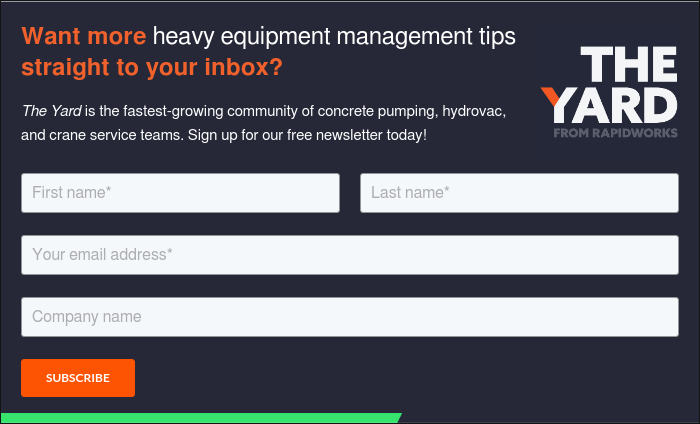
9 Recruiting & Retention Strategies to Elevate your Mobile Crane Workforce
One of the biggest concerns in the construction industry is employee turnover, which results in extra hiring and onboarding costs.
In the crane industry, safety concerns, competing job offers, and inconsistent work all contribute to churn rates. Furthermore, skilled labor shortages make it harder to replace lost workers.
A well-rounded team that works well together is critical to your business's long-term success. In this article, we'll explore recruiting and retention tactics to help your business thrive.
We'll cover:
- Recruitment Strategies to find the best candidates
- Retention Strategies to improve work-life balance and job stability
Recruitment Strategies for Crane Operators and Rigging Personnel
A thoughtful approach to recruiting can save companies money and stress. That's why it's pivotal to incorporate these construction recruiting tips as you fill vacant positions.
Leverage Industry-Specific Job Boards
You can't roll the dice when hiring. When posting job listings, make entries on industry-specific platforms, like Crane Network or ConstructionJobs.com. These places offer targeted talent pools, increasing your likelihood of finding experienced crane operators and riggers who require less training and pose fewer safety hazards.
It's also wise to partner with crane and rigging associations, industry events, and conferences to connect with qualified candidates.
Develop an Apprenticeship or Training Program
The best operators have a genuine passion for their job. Apprenticeship programs are excellent for providing hands-on training for individuals who are interested in becoming certified crane operators or riggers. Such a program can help you develop an internal talent pipeline, which costs much less than hiring outside professionals.
You can form partnerships with local technical schools or trade programs that offer certifications for heavy equipment and crane operations. Government assistance can also help you build occupation-specific programs piece by piece.
Pro tip: Offer internships to recruit new graduates and put them through a work-study program to provide real-world experience and potential long-term employment.
Target Military Veterans and Skilled Tradespeople
Military veterans possess much of the technical skill and discipline necessary for crane operations and rigging. For example, many vets have years or decades of experience with mechanical work on heavy machinery and operating under strict deadlines and demanding work schedules. Seek veteran transition programs and offer fast-track certifications or apprenticeships to local veterans with related experience and safety training to build your all-star crew.
Consider recruiting skilled tradespeople as well, such as mechanics, construction workers, or equipment operators. Workers with a construction background can easily fit into crane and rigging roles. You can then provide on-the-job training to bridge the gap between their current skill set and your specific technical and safety requirements.
Retention Strategies for Crane Operators and Rigging Personnel
Recruitment is step No. 1. You also need to ensure your employees are satisfied, safe, and engaged.
Here are a few tactics for retaining equipment operators and avoiding excessive churn.
Create a Safety-First Work Environment
Mitigating the likelihood of injury or illness means you must prioritize safety as a core value in your company culture.
Strong safety protocols protect workers, reduce turnover, and build trust. To embed safety into the daily workflow, schedule routine training sessions and discussions. Also, distribute resources about workplace safety and specific job site instructions. With the right information about their job sites, your operators can avoid hazards and injuries.
Pro tip: Consider conducting toolbox talks on a recurring basis to help your staff identify potential job hazards. Check out our blog for ideas on toolbox talks topics, like heavy-equipment lightning safety and addressing blind spots.
Implement Lines of Communication Between Team Members
Creating a safety-first culture means keeping communication channels open and ensuring your workers have on-site job support. Encourage a culture of teamwork, wherein operators, riggers, and management work closely together, fostering mutual respect and shared goals.
Pro tip: Give your team the tools it needs to succeed. One of the best ways to accomplish this is through a digital job management platform like Visual Dispatch, by RapidWorks. Digital job management solutions allows your entire team to review the job details ahead of time and helps them prepare for the job in a timely manner.
Invest in Tools to Centralize Communication
Proper communication is fast and centralized. Given their communication needs, crane businesses must invest in connecting their teams through digital solutions that allow supervisors to communicate directly with their crews, whether it's about safety, equipment hazards, maintenance needs, or training. This creates a culture of transparency and allows each team member to operate as safely as possible.
Offer Competitive Compensation and Benefits
Inadequate wages remain one of the biggest reasons construction companies lose employees, especially with wage growth in the construction industry largely remaining flat as living costs rise.
As a solution, you can offer performance-based bonuses or incentives, such as safety bonuses, and conduct market research to ensure your compensation package remains competitive in the industry.
Improving your retention requires thinking beyond base pay and offering flexible benefits packages that include:
- Health and life insurance
- Retirement plans
- Paid time off
- Wellness programs or family support initiatives
Pro tip: Consider offering benefits that cater to the unique needs of crane operators, such as long-distance travel stipends or accommodations for out-of-town projects.
Provide Career Growth and Advancement Opportunities
Workforce development is a massive part of employee satisfaction. Provide opportunities for ongoing training and certification, such as National Commission for the Certification of Crane Operators (NCCCO) certifications or advanced rigging qualifications.
Show new hires that hard work results in career progression by providing opportunities for operators and riggers to advance to higher roles, such as lead operator, safety supervisor, or operations manager.
Whenever possible, promote internally. Promoting existing employees not only rewards loyalty but also helps you retain your most skilled personnel, which is more affordable than hiring from outside. This creates a culture of loyalty among your crew.
Pro tip: Demonstrate that long-term career growth is achievable by highlighting success stories within the company.
Improve Retention Through Work-Life Balance and Job Stability
Finally, it's essential not to overwork your employees, as a poor work-life balance is responsible for 24% of all employee turnover.
Offer Flexible Work Schedules
Flexible work schedules or job rotations allow employees to balance their personal lives with the demands of their jobs. Find opportunities to establish rotational programs that allow operators and riggers to alternate between high-demand tasks and lighter duties.
Pro tip: Providing flexibility reduces burnout, particularly for employees who must travel long distances or work in physically demanding conditions.
Provide Job Stability and Consistent Work
Secure long-term contracts that provide steady work for your employees. Job security and predictable schedules reduce stress and anxiety from fluctuating workloads.
Implement Workforce Recognition and Support Programs
If you set specific goals, always publicly recognize and reward employees who meet them, whether they're safety milestones or long service records.
Include programs or counseling services to support employees' mental and physical health in your benefits package as well.
Pro tip: You can foster a positive work environment and increase your job satisfaction by implementing a peer recognition program to reward employees for excellent work. Support programs can also reduce absenteeism, improve morale, and keep your workforce motivated and engaged.
Interested in investing in tools that can boost your crane operation's efficiency?
Visual Dispatch, by RapidWorks, promotes collaborative worksites for crane businesses, allowing teams to view and share pertinent information concerning safety, hazards, equipment, and training for each job. Sign up today for a free demo.
